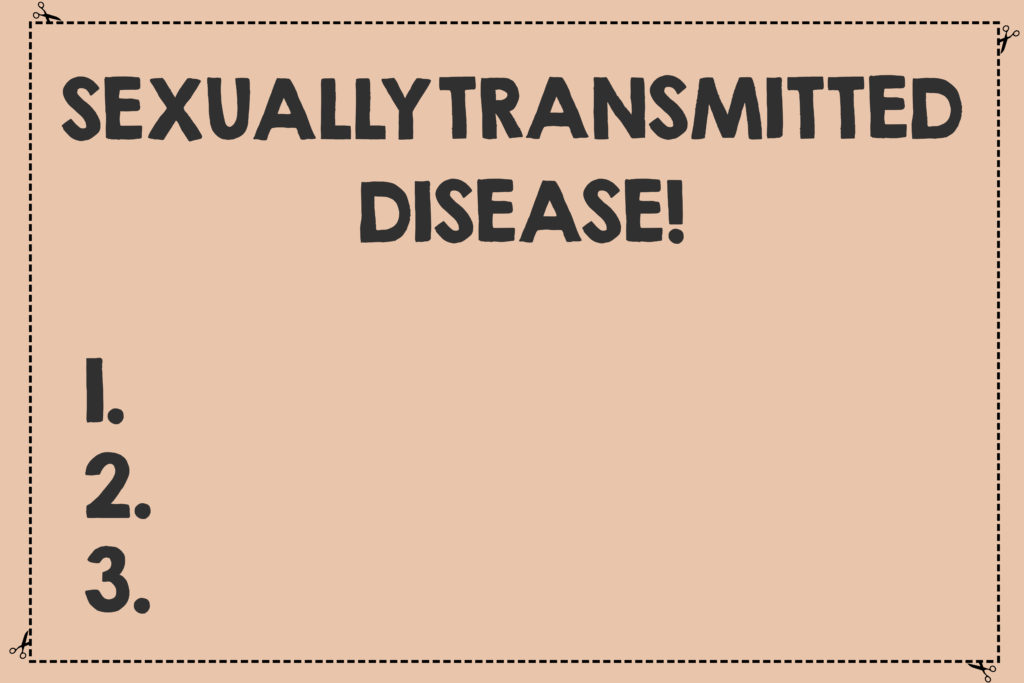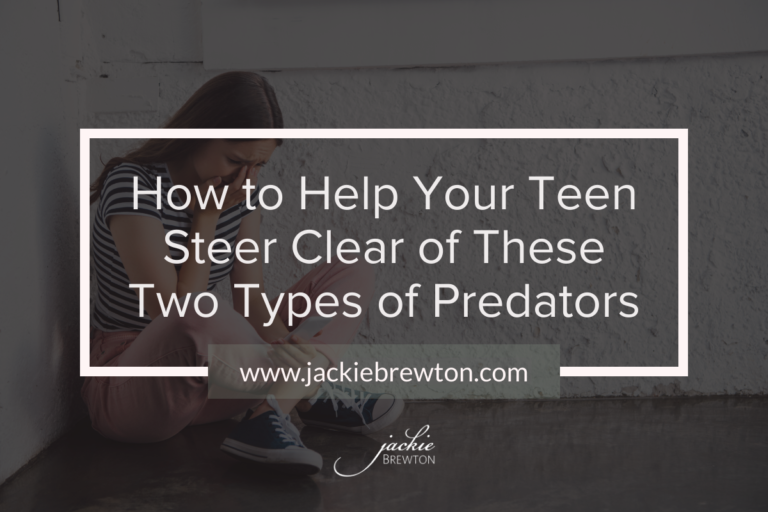3 Myths About STDs Your Teen Needs to Know

Since April is STD Awareness Month, let’s talk STDs…
Most teenagers tell me that they don’t discuss STDs before having sex.
In fact, whenever I ask students if they have the STD conversation before having sex, I typically hear the following:
Student: “No because it’s too awkward. If you ask them if they’ve been tested, they’re going to say, ‘What are you trying to say?’”
Me: “At which point I’d respond, ‘I’m trying to say that I don’t want to get an STD.’ I’d think that dealing with an STD would be more awkward than asking the person whether they’ve been tested.”
But you know what?
I don’t even think “awkwardness” is the real issue here.
Misinformation is.
STD Myth-Busting 101
When it comes to teens and sex, there’s a lot of misinformation out there.
I could write a book filled with nothing but myths I hear from students.
Myths maybe even your daughter believes.
And if left unchallenged, can prove dangerous for her.
That’s why I’m calling your attention to three myths I often dispel in the classroom, so you can do the same with your daughter at home.
Just in case…
Myth #1:
I think teens are reluctant to ask about their partners’ STD status because of the myth that a person has to be “promiscuous” in order to have an STD.
When in reality, an STD can be contracted with only one sexual partner or one sexual act.
Which is why I share this email I received from a health teacher with students in every class:
Jackie, I have a student who is at a loss for words. She recently had sex for the first time and has now been diagnosed with herpes. She is a mess and is seeking guidance from me. I’m not sure what to tell her. Any input you could provide would be appreciated.
Myth #2
Another myth that keeps teens from asking their partner about STDs is they believe the STDs will be visible. So, they figure if they don’t see anything the person doesn’t have anything.
This is the letter I share to dispel that myth:
You spoke to my health class a couple of weeks ago and like I said in the letter I wrote, you really changed my mindset about sex. You taught me so much and really inspired me to take sex more seriously. I made a pledge to myself that day, that I was done having sex as a teen. I had an OBGYN appointment the next week to talk to my doctor about getting on birth control pills because of how bad my menstrual cramps get. While I was there I had them do an STD screening. My test came back positive for herpes simplex 1 & 2. I had to tell my ex-boyfriend and the guy I had sex with last. Neither of them has ever experienced an outbreak. I definitely believe them because I haven’t had an outbreak either. But, I don’t understand how this is even possible.
Myth #3:
They don’t believe STDs are as big of a deal as a teen pregnancy.
Quite frankly, I don’t think their belief is much different than that of parents, or society as a whole for that matter.
Most of the focus on prevention has been centered around teen pregnancy, not STDs.
But here’s the thing Mom…
As much as a teen pregnancy could change your daughter’s life, she can survive a pregnancy.
The consequences from an STD could be far more devastating and long lasting.
So I do make it a point to talk about the STDs that could kill them (i.e., HIV and HPV, which causes cervical cancer).
But it’s the following letter that really gets their attention:
I began having sex at the age of 14, and sex truly does add so much stress to a young girl’s life that is so unnecessary. I [recently] tested positive for chlamydia. I had gone so long without treatment that my tubes are now closed off with scar tissue. So, not only did I let [my ex-boyfriend] take advantage of me, I let him take a part of my future with him. You see, I am now 17 years old and I am living with the guilt of it being my fault that I can’t and won’t ever successfully carry a baby to full term.
My OBGYN says that I won’t ever be able to carry a baby to full term even if it makes it through my [fallopian] tubes because of the amount of scar tissue I have inside of my uterus. So now, I can’t have biological children created in my body. Not to mention, now, sex is NOT enjoyable at all. It hurts, it’s uncomfortable, and it’s not something I want to do AT ALL anymore.
You know what’s so tragic about this young lady’s story?
The fact that chlamydia is 100% curable!
There is absolutely no reason why she’s infertile.
It was totally preventable if she had just gone to the doctor to get checked regularly.
An antibiotic would have gotten rid of the chlamydia within a couple of weeks.
If only this young lady was armed with information…
Are You “In the Know?”
So why do teens opt NOT to get tested?
Even though teenagers contract STDs at a higher rate than adults, they’re probably the least likely to get checked for STDs.
And largely because they don’t want their parents to know they’re sexually active.
Students often stay after class to ask me if I know anywhere they can go to get tested for STDs without their parents’ knowledge.
Although I always encourage them to tell their parents, sometimes I have more success than others:
Thank you for coming and speaking to my class. It really changed my mind on things. I have decided to stay abstinent until I’m married. The entire time I was crying on the inside because I have an STD and I have not been treated for it because I’m afraid to tell my parents. But thank you again because now I will try to get help.
So, what about your daughter?
Would she be afraid to tell you if she had sex that resulted in her contracting an STD?
If you’re concerned the answer is “YES,” start having open and honest conversations with her about STDs now.
Again, I recommend focusing more on the positive benefits she’ll experience from abstaining from sex than on the negative consequences of having.
But not talking about STDs at all is a mistake.
As you can see, even the infections that have a cure (like chlamydia), can inflict long-term damage if left untreated.
The bottom line is this: What you and your daughter don’t know about STDs could hurt her.
So here are a few DO’s and DON’Ts to help both of you expand your awareness of STDs:
- DO Educate yourself so you can Equip your daughter. The CDC is a great resource for the latest medically-accurate information about STDs.
- DON’T take your newfound information and lecture her with a bunch of facts. It’ll feel too much like school and will go in one ear and out the other.
- DO ask open-ended questions to gauge what she already knows or thinks she does. A good place to start is asking her what she’s learned about STDs in health class, or has heard from friends.
- DON’T clam up if/when she asks you questions in return. This is your opportunity to have a mutually engaging and beneficial conversation.
- DO use real-life news stories, pop-culture, media, etc. as a conversation-starter.
- DON’T make this a one and done conversation. It should be ongoing.
- DO focus more on the benefits of abstaining.
- DON’T go the “Scared Straight” route of making her sit through a slideshow of diseased sex organs. (I never do this with my students and they still “get it”).
Use these tips to create a judgment-free zone where your daughter feels “safe” coming to you with her questions, concerns, and yes—even confessions about love, sex, relationships, and STDs.
You’ll both be glad you did.
How have you broached the subject of STDs with your daughter? And how open has she been to discussing STDs with you?
As always, I encourage you to respond by commenting below. I love hearing your feedback so don’t be shy!
P.S. I get that talking to your daughter about STDs is probably not your or her idea of “fun,” but it is necessary. There’s so much misinformation out there coming from her peers and even the media that you can’t afford to just leave it up to her school to educate her. You have to make sure she’s receiving accurate information so she can make informed decisions.
P.P.S. STD Awareness Month may not be a “sexy” topic to talk about on social media, but do parents you know a favor by sharing this post.



